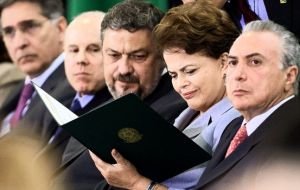MercoPress. South Atlantic News Agency
Rousseff tries to overcome internal rift and launches plan to eliminate extreme poverty
 The reconciliation photo: Rousseff next to questioned Palocci and Vice president Temer
The reconciliation photo: Rousseff next to questioned Palocci and Vice president Temer Brazilian President Dilma Rousseff launched an ambitious plan to eliminate dire poverty in Brazil within four years by lifting more than 16 million people from conditions of “misery”.
The “Brazil Without Misery” program is the signature policy of the former guerrilla's first term, her advisers said, fulfilling one of the key promises she made in her campaign for the presidency last year.
Poorer voters, millions of whom benefited from rapid economic growth and an expanded anti-poverty program under former President Lula da Silva have become the main electoral base for Rousseff's Workers' Party.
The announcement of the new program in the capital Brasilia was a welcome relief for Rousseff following weeks of negative media coverage over a scandal that has tainted her chief of staff and exposed differences with her main coalition ally, the PMDB party.
The success of the Bolsa Familia family stipend program under Lula da Silva, which helped lift about 20 million people into a thriving lower middle class, showed that cutting poverty was a crucial part of Brazil's economic success, Rousseff said at a ceremony in the capital.
“Brazil proved to the world that the best way to grow is distributing wealth,” she said, flanked by her troubled chief of staff Antonio Palocci and Vice President Michel Temer of the PMDB in an apparent show of unity.
Despite the strides Brazil has made in recent years, with brisk growth rates that have pushed it up the ranks of the world's largest economies, it still faced a “crisis” of poverty that was more serious than any financial crisis, she said.
“We can't forget that the most permanent, challenging and harrowing crisis is having chronic poverty in this country”. Brazil figures in the short list of Western countries with the worst income distribution.
The new program aims to raise 16.2 million people above the level of extreme poverty, defined as an income of less than 70 Real (44 USD) per month, through a multi-pronged approach of expanded financial aid, improved education, access to water and energy, as well as job training.
The Bolsa Familia program, which gives a monthly stipend to families based on their children's school attendance, will be expanded to another 800,000 families, officials said.
The program, which has been praised by the World Bank and copied by other developing countries, already reaches more than a quarter of Brazil's 190 million population.




Top Comments
Disclaimer & comment rulesCommenting for this story is now closed.
If you have a Facebook account, become a fan and comment on our Facebook Page!